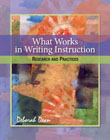Last year I was invited to a special writing workshop introducing Debbie Dean's new book, What Works in Writing Instruction: Research and Practices.
As part of the workshop, we did some model writing. We looked at various book reviews from NPR, then we wrote our own versions based on what we noticed the reviewers doing.
Don’t Give Up on Memory
I’ve only fainted
one time in my life—after I gave birth to my first-born son. A be-scrubbed
nurse had just told that he was dying, and she was trying to get me on my feet
so I could see him for the last time. As I came out of the faint, I saw my
husband and the nurses’ concerned faces looking down at me, and . . . I
couldn’t remember what was happening and why I was on the floor. Within
minutes, my memory came crashing back, but I will never forget the immense
weight of it as I realized what was happening.
Memories
can do this. They can be heavier than mountains. They can add burdens and pain
to everyday life. Some of us may wish that we could get rid of our memories and
unburden ourselves. We long to be free.
In The Giver by Lois Lowry, an entire
nation has done just that. They’ve passed on the mantle of remembering to just
one person—know as the Receiver of Memories. At first the memory free society
seems like utopia. There is no anger, no violence, no fear. None of the baggage that comes with
memory.
But as the
book continues, Lowry reminds us that memories are also about love, kindness,
compassion, ethics, even basic morality. People without memories are people
without a conscience. Memory becomes something to treasure and to fight for.
As
for me, I re-read this book again immediately after I first read it, and then I
got up at 5 o'clock in the morning and took a two-hour walk to think about it.
It disturbed me, it shook me, it made me think. Even with all the painful memories I have --
particularly the death of my infant son -- I would never want to give up my
memories -- they are just too precious.
If
you are a person with memories, whether they are sweet, bittersweet or
downright painful, you must read this book.
I don't remember exactly why I was highlighting certain sections -- I think blue was personal connections, green was ? yellow was summary, and pink was my reaction to the book? I'll have to go back, find my notes, and check.

No comments:
Post a Comment